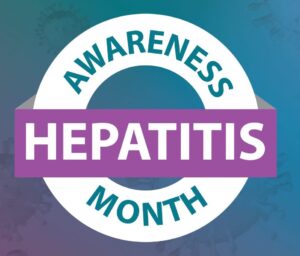 The month of May is designated as Hepatitis Awareness Month in the United States, and May 19th is Hepatitis Testing Day. During May, the CDC and public health organizations work to shed light on the impact of these hidden epidemics by raising awareness of viral hepatitis while encouraging testing and vaccination. Hepatitis Awareness Month activities help to improve everyone’s understanding of viral hepatitis transmission, risk factors and to decrease social stigma against viral hepatitis.
The month of May is designated as Hepatitis Awareness Month in the United States, and May 19th is Hepatitis Testing Day. During May, the CDC and public health organizations work to shed light on the impact of these hidden epidemics by raising awareness of viral hepatitis while encouraging testing and vaccination. Hepatitis Awareness Month activities help to improve everyone’s understanding of viral hepatitis transmission, risk factors and to decrease social stigma against viral hepatitis.
Viral Hepatitis Key Facts
- There are several different viruses that can cause hepatitis; the most common types of viral hepatitis are hepatitis A, hepatitis B, and hepatitis C.
- Chronic hepatitis B and hepatitis C are leading causes of liver cancer in the United States.
- Both hepatitis A and hepatitis B are preventable with safe and effective vaccines, and hepatitis C is curable with prescribed treatment.
- About 66% of people with hepatitis B are unaware of their infection and about 40% of people living with hepatitis C do not know they are infected.
- Getting tested is the only way to know if you have hepatitis A, hepatitis B or hepatitis C.
Learn the ABCs of Viral Hepatitis
Hepatitis A
Hepatitis A is a contagious liver infection caused by the hepatitis A virus. People who get hepatitis A may feel sick for a few weeks to several months but usually recover completely and do not have lasting liver damage. The hepatitis A virus is found in the stool and blood of people who are infected and can be spread when someone ingests the virus, usually through eating contaminated food or drink or through close personal contact with an infected person. Hepatitis A is very contagious, and people can even spread the virus before they get symptoms. However, hepatitis A is easily prevented with a safe and effective vaccine.
Hepatitis B
Hepatitis B is a liver disease caused by the hepatitis B virus. Some people who become infected, can go on to develop a chronic or lifelong infection. Over time, chronic hepatitis B can cause serious liver damage, and even liver cancer. There is no cure for hepatitis B, but treatments are available that can delay or reduce the risk of developing liver cancer.
Hepatitis B is spread when blood, semen, or other body fluids from a person infected with the virus enters the body of someone who is not infected or has not been vaccinated. This can happen through sexual contact; sharing needles, syringes, or other drug-injection equipment; or from mother to baby at birth.
Hepatitis B can be prevented with a safe and effective vaccine.
Hepatitis C
Hepatitis C is a liver infection caused by the hepatitis C virus. For some people, hepatitis C is a short-term illness, but for more than half of people who become infected with the hepatitis C virus, it becomes a long-term, chronic infection that can lead to liver disease and liver cancer.
Rates of new infections have been on the rise, particularly among young adults, which coincides with the recent increase in injection drug use related to the United States’ opioid crisis. While more uncommon, hepatitis C can also spread through health care exposures, sex with an infected person, birth to an infected mother, and tattoos and body piercings from unlicensed facilities or informal settings.
There is currently no vaccine to prevent hepatitis C. But treatments are available that can cure hepatitis C. Most people with hepatitis C can be cured in just 8 to 12 weeks. Testing is the first step.
For additional information regarding testing for hepatitis and or treatment options, please consult your health care provider.
Northwest Health Services has numerous providers who treat hepatitis. Call your local Northwest Health clinic for an appointment. If you have additional questions regarding this virus or Human Immunodeficiency Virus (HIV) or would like assistance to schedule an appointment with one of our providers, please contact Janet Miller, HIV Prevention Specialist @ 816-901-1034.
** Information in this Blog is (in part) from cdc.gov/hepatitis/awareness
